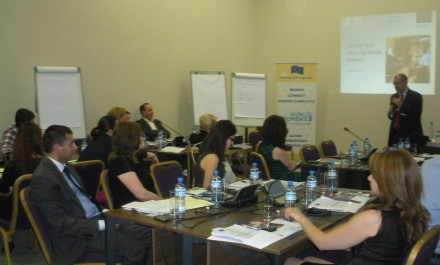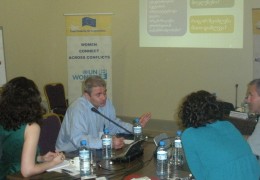UN Women builds the capacity of decision makers to integrate gender in the security sector of Georgia
Date:
The government of Georgia has adopted in December 2011 the National Action Plan for the implementation of the UN Security Council Resolutions # 1325, 1820, 1888, 1889 and 1960 on “Women, Peace and Security” for the years 2012-2015.
“One of the key elements for the actual implementation of the National Action Plan on Women Peace and Security is the increased women’s participation in the security reforms. This workshop has greatly contributed to the implementation of this task as it has provided very useful information to the representatives of key government institutions on the major principles and ways of gender mainstreaming into the security agenda”, said Ms. Rusudan Kervalishvili, Deputy Speaker of the Parliament of Georgia and Chair of the Gender Equality Council.
The UN’s core guiding principles based on lessons learned, international law and standards and existing United Nations policies state that “security sector reform must be gender sensitive throughout its planning, design, implementation, monitoring and evaluation phases. It must also include the reform and recruitment processes and improvement in the delivery of security services to address and prevent sexual and gender based violence”.
“The resolutions call on States and UN institutions to ensure the full inclusion of women needs and perspectives in peace building, emphasizing the protection and security needs” said Graziella Piga Cross-regional Programme Manager. “In this framework the security sector and its reform plays a pivotal role in ensuring that these resolutions are fully implemented. The integration of a gender perspective into security sector work and reforms (SSR) is paramount to deliver efficient security and justice services that meet people’s needs, ensure accountability to the state and its people and operate in full respect of human rights” she added.
The workshop addressed topics such as the role of civil society in SSR, gender-sensitive security needs and policies, access to justice and security services, gender sensitive oversight of the security sector. Representatives at the very high level from the Ministries of Justice, Internal Affairs, Defense, Internally Displaced Persons and Refugees, Foreign Affairs, Health and Social Affairs, Finance, as well as National Security Council, Ombudsman’s Office and Parliamentary committees actively participated in the workshop and expressed their interest to follow up on this workshop and put into practice the new knowledge.
About UN Women in Georgia
UN Women is the UN organization dedicated to gender equality and the empowerment of women. A global champion for women and girls, UN Women was established to accelerate progress on meeting their needs worldwide. For more information, visit www.unwomen.org.
UN Women renewed its presence in Georgia in June 2008, becoming an active member of the UN Country Team. The UN Women office in Georgia, in collaboration with other UN agencies, currently supports the government and civil society partners in realizing their commitments under CEDAW and the Beijing Platform for Action to enhance gender equality and strengthen women’s empowerment.
About the programme ‘Women Connect Across Conflicts’
UN Women’s Cross-regional programme – “Women Connect Across Conflicts: Building Accountability for Implementation of UN SCR 1325, 1820, 1888, 1889” is funded by the European Union. The aim of the programme is to enhance the capacity of Women’s human rights activists and gender equality advocates and their networks to effectively and meaningfully engage, influence, and mobilize for dialogues on security and peace issues at various levels nationally and regionally in Southern Caucasus (Georgia, Armenia, Azerbaijan), South Asia (Pakistan and Afghanistan), and Central Asia / Fergana Valley (Tajikistan, Uzbekistan and Kyrgyzstan).
The project supports the development/monitoring of the National Action Plan (NAP) on 1325 in Georgia and intends to draw best practices on the elaboration process that can be further duplicated in other countries.
Additionally, the programme looks at existing referral mechanisms that provide redress for sexual and other forms of violence against women in situations of conflict with the aim to strengthen and improve them.
A close review of the security sector is foreseen so to incorporate gender equality principles into their internal operations and promote zero tolerance to using sexual violence as a weapon of war.
The Programme also aims at mobilizing national partners at local level to engage in evidence-based dialogues and advocacy for reconciliation, tolerance building and compliance with Women’s human rights obligations.
About Geneva Center for the Democratic Control of Armed forces DCAF
DCAF is an international non-profit foundation established on the initiative of the Swiss Confederation, as the 'Geneva Centre for the Democratic Control of Armed Forces. DCAF contributes to enhancing security sector governance (SSG) through security sector reform (SSR). The Centre works to support security sectors.DCAF is guided by the principles of neutrality, impartiality, gender sensitivity and local ownership as the basis for supporting legitimate, sustainable reform processes. For more information, visit www. http://www.dcaf.ch/

